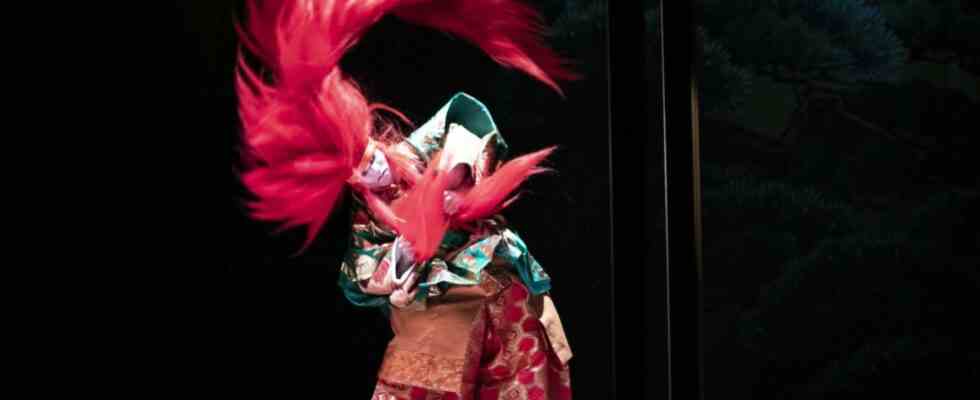The Berlin Schaubühne’s FIND Festival has long been the liveliest, most powerful, most beautiful theater festival in Berlin: a large window opens onto the world and world theater – this year, for example, with Robert Lepage’s great Canadian company Ex Machina. In addition to this fresh breeze and the view into the distance, the Berlin Theatertreffen, for example, with its increasingly quirky selection, seems quite provincial and a little too strained to be trendy. Last year, FIND provided the urgently needed theatrical antidote to corona depression with guest performances by the Spanish hardcore performer Angélica Liddell. This year the depressing question is: What can a theater festival do if cities are not so far away being bombed and civilians being massacred? How can you look forward to what’s happening on stage now?
As always with FIND, the theater’s responses are pleasingly heterogeneous and about as diverse as the countries from which the guest performances come. And quite often you leave the Schaubühne touched and, well, comforted because in the one, two or seven hours of a performance you’ve encountered amazing people – and truths about what that is: a person. In the minimalist French-Swedish production “L’Aventure invisible” (director: Marcus Lindeen) you can listen to people who have to find their way around their lives and their identity again after a stroke with severe brain damage or after a face transplant. In the shrill Chilean performance “Oasis de la Impunidad” (director: Marco Layera) you can see how people are trained and how thugs are formed in the service of an authoritarian government. However, the grotesque shocking images of practical surrealism seem somewhat arbitrary.
It’s about open violence against black people, but also about the “legacy of self-loathing”
Unfortunately, director Caroline Guiela Nguyen, who lives in Paris and comes from a family of Vietnamese immigrants, cannot repeat the success of her quite rightly celebrated FIND debut “Saigon” with her somewhat confused, astonishingly weak acting dystopian scenario “Fraternité, Conte fantastique”. from 2018. The two most important guest performances, which are admirable in every respect, come from North America: Canadian Robert Lepage, who has been one of the great directors of world theater for decades, and his company Ex Machina show the intricate, crystal-clearly told epic “The Seven Streams of the River Ota”.
Impressive personality: Dael Orlandersmith deals with racism and police violence in her solo “Until the Flood”.
(Photo: Joey Moro)
From St. Louis, Missouri comes the one-woman show Until the Flood from smart, powerful, angry author and solo performer Dael Orlandersmith. She succeeds in dealing with racism and police brutality in a variety of voices with a hardness, precision and differentiation that turns the 70-minute monologue into a condensed sociological-human study of the lines of conflict in a society poisoned by discrimination and violence.
Candles, flowers, stuffed animals and protest posters are set up in front of the small platform stage, a memorial to the black teenager Michael Brown, who was shot dead by a white police officer in Ferguson, Missouri in 2014 for trivial reasons. Dael Orlandersmith, an impressive stage presence, works his way through eight short monologues, eight succinctly sketched portraits of black and white residents of Ferguson trying to come to terms with this murder, each and every one in a different way: the white cop, speaking in a thick Southern accent thinks every cop is his brother, black or white. The high-spirited black teenager full of rage who, some days, wants to yell at every white cop to just shoot him.
A white electrician who has worked his way up from the lower class to modest prosperity and fantasizes about murdering black people, just as Jews were shot at roll call in Auschwitz, a wide-legged racist. An elderly black woman, a former teacher, tired, pensive, full of dignity who has experienced racism her whole life and wonders what not only the open violence but also the “legacy of self-loathing” is doing to people.
“The Seven Streams of the River Ota” uses the stylistic devices of Japanese theater and leads from Hiroshima in 1945 to the turn of the century in New York.
(Photo: Elias Djemil)
Dael Orlandersmith talks about what racist hatred does to people and society, while Robert Lepage’s epic “The Seven Streams of the River Ota” is about the desire for reconciliation and peace. And it’s about the shame of a war crime, the atomic bombing of the Japanese city of Hiroshima. This is how the evening begins: A little girl goes blind when she looks into the atomic lightning. In the end we will see her as an old woman, her whole life marked by that childhood flash. Lepage’s production is an American-Japanese-Canadian-European journey through time across several generations, from Hiroshima in 1945 and from the German Theresienstadt concentration camp to bohemian New York in the 1960s and up to the turn of the century. The people on this journey are connected to one another in many ways, but they all try to come to terms with the echoes and long-term effects of the war. The underground artist we meet in Beatnik New York was in a concentration camp as a child, but becomes a Buddhist nun in old age – a long way to healing from her terrible childhood. An American soldier commissioned by the army to document the aftermath of the atomic bomb falls in love with a Japanese woman and returns to Texas. Years later, the son of the GI and the Japanese woman is looking for his father in New York and meets his own half-brother.
Lepage’s cinematic and very direct storytelling, his loving, accurate character drawings, the epic breath of the seven-hour production make it a masterpiece. It hasn’t lost any of its power since it premiered in the mid-1990s. “Human theatre,” says one visitor, that’s exactly what it is. And it describes why we need Lepage’s human theater so badly right now.

